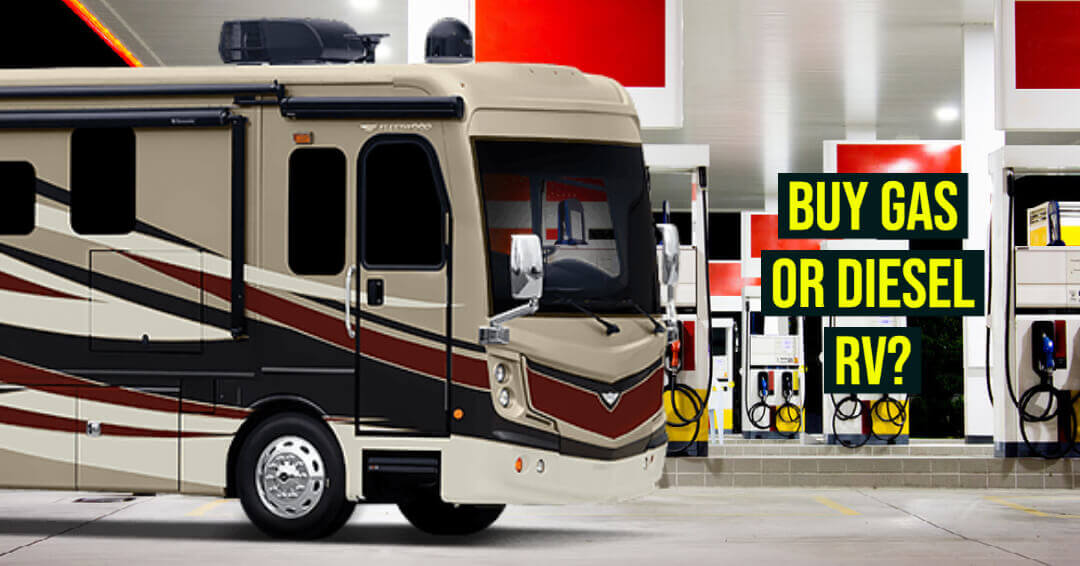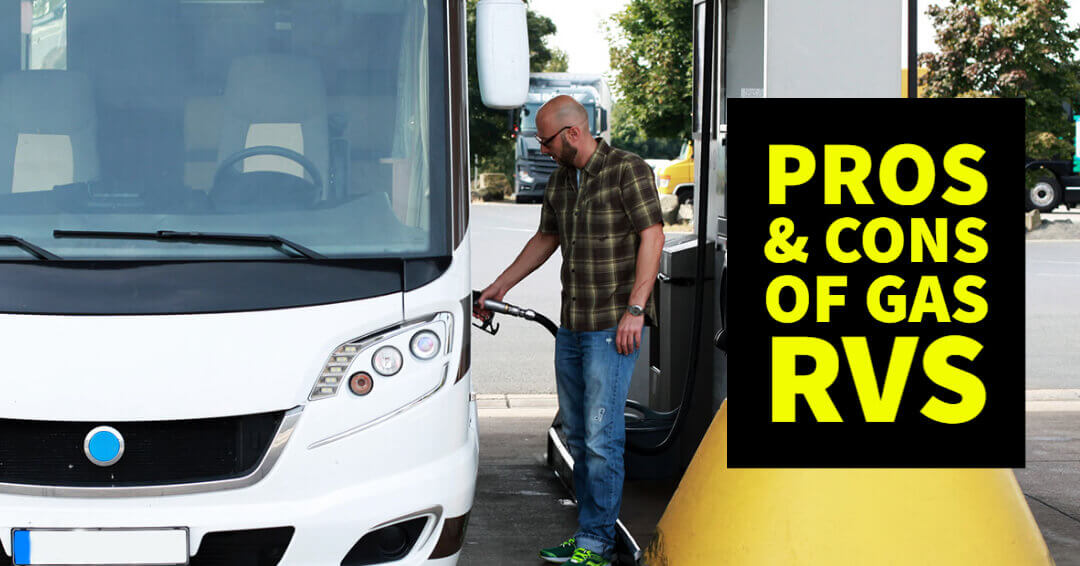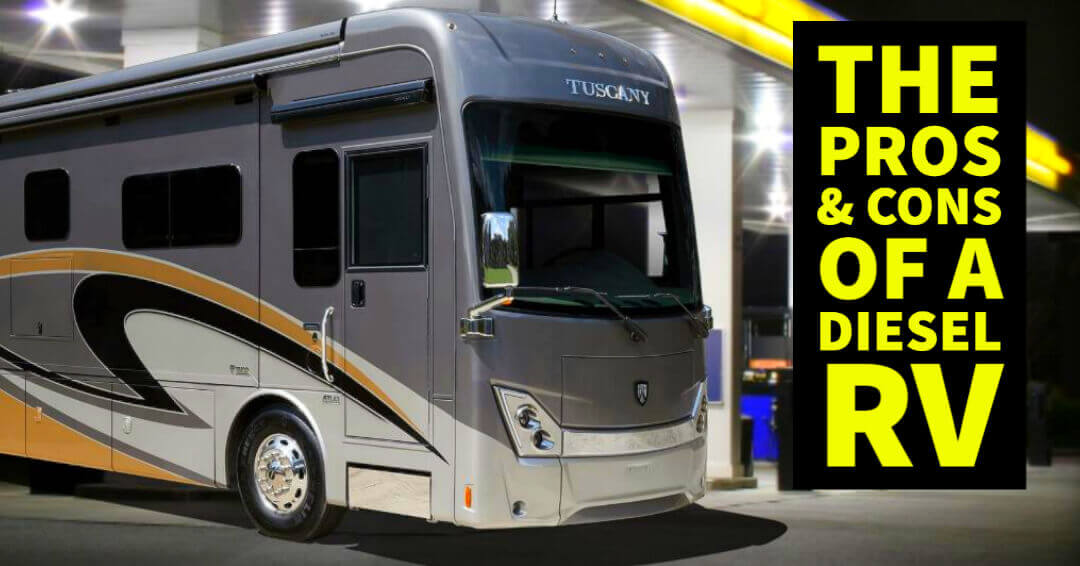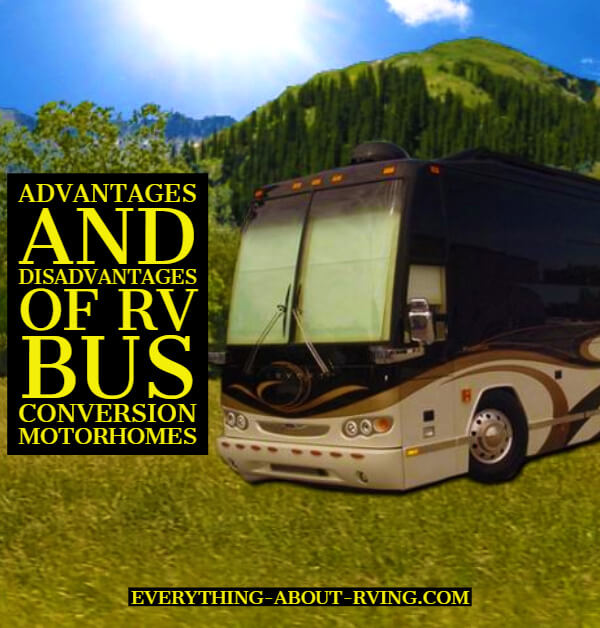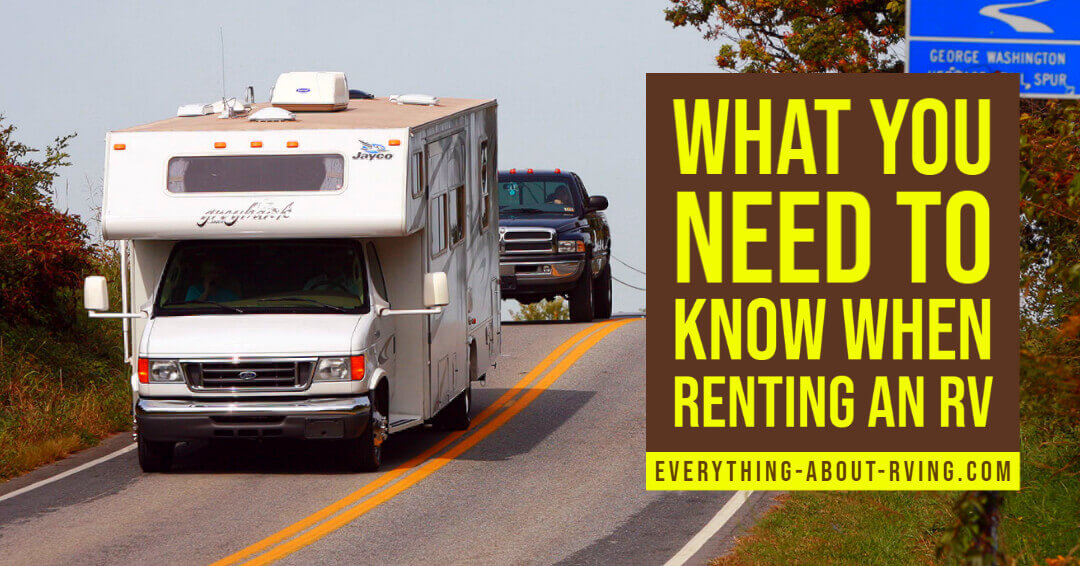- Home Page
- The Types of RVs
- Gas VS Diesel RVs
Gas VS Diesel RVs:
What's Best for Your RVing Adventures?
Gas vs Diesel RVs? That is the Question
Is a Gas vs Diesel RVs or tow-vehicle right for you? Below are the Pros and Cons of Gas-powered RVs and tow-vehicles and Diesel-powered RVs and tow-vehicles which should help you make this major decision.
Gas Engine Pros and Cons
PROS
- A gas-powered Motor Home or tow-vehicle initially costs less to purchase (saving money is always a good thing).
- A gas engine is cheaper to maintain (parts and service cost less).
- Gas powered Motor Homes or tow-vehicles are more do it yourself friendly (if you are comfortable working on gas engines, you will be better able to perform routine maintenance yourself)
- Gas Motor Homes and tow-vehicles are quieter than diesel (some folks debate this, but it has been our experience that they are quieter).
CONS
- Gas powered Motor Homes and tow-vehicles have a lower lifespan than Diesel powered vehicles.
- Gas powered vehicles are not as fuel efficient as diesel, on average they have a lower MPG rating.
- A gas Motor Home or tow-vehicle does not retain its value as well as a diesel-powered vehicle (shorter lifespan and less MPG equals less value retention).
- Gas engines produce more CO2 emissions (CO2 is considered to be the catalyst to global warming).
- Gas engines lose power with altitude (when you are climbing hills the diesel Motor Homes will be passing you by).
- Gas engines and chassis have less towing and carrying capacity than a diesel engine and chassis.
- Gas Motorhomes have fewer floor plan choices than diesel Motorhomes. They also do not have the luxurious interiors that are reserved for diesel Motorhomes (but, with the money you save on initial purchase you can always add this stuff yourself)
- Gas motorhomes do not ride as nice as Diesel Motorhomes. Diesel Motorhomes have beefier chassis and suspension systems that usually provide a smoother ride.
Let's move on to the Pros & Cons of a Diesel RV or Tow Vehicle.
Diesel Engine Pros and Cons
PROS
- Diesel engines are more fuel efficient than gas engines; you can expect more miles per gallon (don't expect a dramatic difference).
- Diesel engines, if properly maintained, have a longer lifespan than gas engines. It is not unheard of for diesel engines to go well over 200,000 miles before requiring a rebuild or overhaul.
- A diesel engine provides more torque at lower RPMs (in laymen's terms it will get up a hill faster than a gas-powered vehicle).
- Diesel Motorhomes have a wider selection of floor plans available. They traditionally have more luxurious interiors than gas powered Motor Homes.
- The chassis of most diesel Motor Homes are beefier than the chassis of gas motor homes. So, the carrying and towing capacity is greater (this is why a lot of Full-timers prefer diesel over gas).
- Altitude does not affect the power of a diesel engine (you will have better acceleration in the mountains).
- Diesel powered Motorhomes tend to have a smoother ride than gas powered motor homes. This is due to the availability of air ride suspension and the heavier chassis.
- Diesel powered Motor Homes and tow-vehicles retain their value better than gas vehicles (better MPG and longer lifespan contribute to this price retention).
- Diesel engines produce less CO2 emissions (CO2 is considered to be the catalyst to global warming).
CONS
- Diesel powered Motorhomes and tow-vehicles initially cost more than gas powered vehicles.
- The maintenance cost for diesel engines is higher than for gas engines (service costs more, parts cost more).
- Unless you are comfortable working on diesel engines, there is not a lot of do-it-yourself maintenance that you can perform (you might be able to replace the air filter).
- Even though Diesel Fuel used to be less expensive than Gasoline, the price has recently risen above gasoline prices and depending on how high the price of diesel goes, it could eventually nullify the increased fuel mileage that diesel gives you.
- Neglecting the routine maintenance on a Diesel engine can result in some very costly repairs.
Conclusion
Now that you know the differences between Gas VS Diesel RVs hopefully, this information will be helpful in steering you in the right direction.
Once you know the best type of RV is right for Your RVing Adventures, you should now head over to the Buying a RV section of this web site to get some more helpful hints. One thing is for sure, you will never regret becoming an RVer regardless of the type of engine you choose.
Frequently Asked Questions
What are some pros of gas-powered Motor Homes or tow-vehicles?
What are some pros of gas-powered Motor Homes or tow-vehicles?
Gas-powered Motor Homes or tow-vehicles have several pros, including lower initial purchase cost, cheaper maintenance, being more DIY-friendly, being quieter than diesel, and having more affordable parts and service.
What are the cons of gas-powered Motor Homes and tow-vehicles?
What are the cons of gas-powered Motor Homes and tow-vehicles?
The cons of gas-powered Motor Homes and tow-vehicles include a shorter lifespan, lower fuel efficiency, less value retention, higher CO2 emissions, power loss at high altitude, lower towing and carrying capacity, fewer floor plan choices, and a less smooth ride compared to diesel.
What are some pros of diesel-powered Motor Homes and tow-vehicles?
What are some pros of diesel-powered Motor Homes and tow-vehicles?
Diesel-powered Motor Homes and tow-vehicles offer better fuel efficiency, longer lifespan, more torque at lower RPMs, more floor plan choices, more luxurious interiors, greater carrying and towing capacity, unaffected performance at high altitude, smoother ride, and better value retention.
What are the cons of diesel-powered Motor Homes and tow-vehicles?
What are the cons of diesel-powered Motor Homes and tow-vehicles?
Diesel-powered Motor Homes and tow-vehicles have higher initial costs, higher maintenance costs, less opportunity for DIY maintenance, and can have higher fuel prices depending on market fluctuations.
